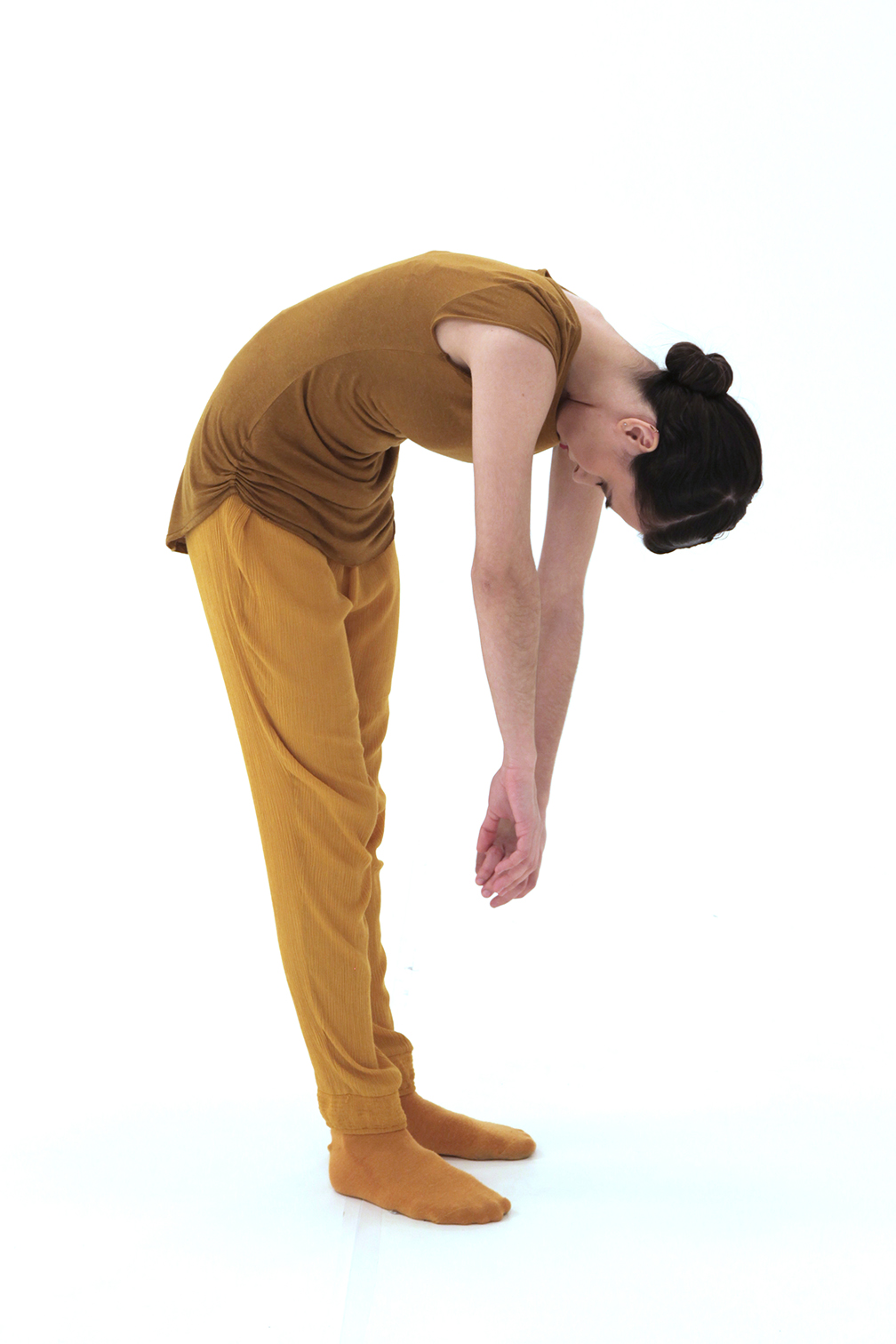Commissioned by the Museum der Moderne Salzburg in collaboration with the Derra de Moroda Dance Archive, Truly Spun Never extends Geyer’s archive-based research into the history of modernism to focus on German modern dance.
The work, made for installation in a whitecube gallery, situates the viewer within three suspended vertical screens filled by life-size projections and surround sound. In each channel of the video, a speaker dressed in a sweater and tie walks, book in hand, around and between six dancers, in a nondelineated white space, which extends into the white space of the gallery. The continuously moving camera captures the performers from multiple perspectives and distances. Dressed in informal rehearsal clothes and with hair and makeup styled after that of German dancers in stage photographs from the 1920s and 1930s, the dancers rigorously rehearse various twirls and pirouettes, their physical activity made tangible through audible breathing, moans, and visible sweat. Through aphoristic address, the speaker attempts to engage the dancers, while dodging their whirling limbs but is only infrequently acknowledged in a glance or slight touch. Intermittently, the speaker stops to open the book and read poems by Romanian-born, German-language poet and translator Paul Celan. As if thinking out loud, the speaker comments on dance and politics: At one point in the video loop, the speaker observes a dancer and then turns to the camera to quote from a letter by dance critic Fritz Böhme, written in November 1933 in support of AustroHungarian dance artist and theorist Rudolf von Laban to Nazi minister of propaganda Joseph Goebbels. He states, “Dance is a race question,” and, in her script, Geyer adds, “until it gets answered.”
The script for Truly Spun Never combines the artist’s reflections with research into dance as a form, from the birth of Ausdruckstanz (expressive dance) in Germany during the rise of the National Socialist Party in 1933 to the end of World War II. Quoted are key progenitors and instigators of German modern dance, including dancer and choreographer Mary Wigman and choreographer Friderica Derra de Moroda. Geyer also quotes Laban, a pioneer of modern dance who was the director of the Deutsche Tanzbühne and, under the auspices of Goebbels’s ministry, the German dance theater and German workshops for dance. In organizing dance festivals and schools of modern dance, he removed all “non-Aryan” dancers from his company. Nevertheless, Laban insisted that dance lay beyond the reaches of politics. Notably, dance was the only form of modern art not labeled as degenerate during that period.
Truly Spun Never recovers lesser-known details about the sociopolitical contours of the early modern dance movement and lays bare contradictions and inevitable relations between art and ideology, artistic expression and ethics and the body and politics that impact the field of dance even today.
performers: Jess Barbagallo, Natalie Cloarec, devynn emory, Lily Gold, Patricia Hoffbauer, Marbles Jumbo Radio, Omagbitse Omagbemi
Credits:
Script: Andrea Geyer
Script Supervision: Catherine Bernath
Director of Photography: Martina Radwan
Assistant to DP: Laura Nespola
2nd Assistant: Ryo Sato
Steady Cam: Jamie Northrup
Sound: John Stadwell
Media Manager: Stephanie Park
Editing: Andrea Geyer
SoundMaster: Rachel Wardell
Production Manager: Lauren Denitzio
Assistant Production & Sound Assistance: Francesca Fiore
Still Photography: Oscar Gracida
Costume: Jocelyn Davis
Styling: Naomi Raddatz
Performance Support: Umber Majeed
Location: BeElectric Studios, Brooklyn
This work was comissioned by the Museum der Moderne Salzburg in collaboration with the Derra de Moroda Dance Archive. It was produced with the generous support of Parque Galeria, Mexico, The New School Research Grant and The Foundation for Contemporary Art Emergency Fund.
Special Thanks: Jane Anderson, Sharon Hayes, Josiah McEhleny, Taisha Paggett, Fred Moten, the team of the Derra de Moroda Dance Archive and the Museum der Moderne, Salzburg and the team of Parque Galeria.
Selected Bibliography:
Dawn Ades, Art and Power: Europe under the Dictators 1930-45. The XXIII Council of Europe Exhibition
Fritz Böhme, “Ist das Ballett deutsch?” in Deutsche Allgemeine Zeitung, Berlin, 25.April, 1933
Paul Celan, Selected Poems and Pose (Norton: New York, 2001)
Rudolf Delius, on Wigman’s Witch Dance, Die Propyläen, 1914
Joseph Goebbels´ letter to Rudolf Kölling, 1936
Stefano Harney and Fred Moten, The Undercommons (Minor Compositions/Autonomedia: Brooklyn, 2013)
Andrew Hewitt, Social Choreography: Ideology as Performance in Dance and Everyday Movement (Post-Contemporary Interventions) . Duke University Press.
Marion Kant and Lilian Karina, Hitler’s Dancers: German Modern Dance and the Third Reich (Berghan: New York, 2003)
Barbara Kirshenblatt-Gimblett and Jonathan Karp,ed, The Art of Being Jewish in Modern Times (University of Pennsylvenia Press: Philadelphia 2007)
Joseph von Laban´s letter to Walter von Keudell, Reichminister,1936
The Laban Sourcebook (Routledge: New York, 2011)
Josef Lewitan, from Der Tanz: Internationale Zeitschrift fur tanzerische Kultur. Berlin (1927-1944)
Fred Moten, andrea geyer / margaret Kerry
Peggy Phelan Unmarked: The Politics of Performance
Der Tanz: Internationale Zeitschrift fur tanzerische Kultur. Berlin (1927-1944)
Mary Wigman, The Mary Wigman Book (Olympic Marketing Corp: Minnetonka, 1975)
Mary Wigman, Witch Dance, 1914
Mary Wigman, Das Land ohne Tanz, Die Tanzgemeinschaft. Vol. I, Nr. 3 (1929)

